

Self-fulfilling prophecy. A self-fulfilling prophecy is a prediction that directly or indirectly causes itself to become true, by the very terms of the prophecy itself, due to positive feedback between belief and behavior.
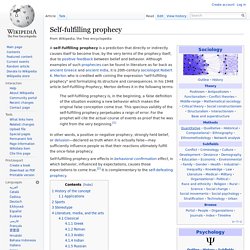
Although examples of such prophecies can be found in literature as far back as ancient Greece and ancient India, it is 20th-century sociologist Robert K. Merton who is credited with coining the expression "self-fulfilling prophecy" and formalizing its structure and consequences. In his 1948 article Self-Fulfilling Prophecy, Merton defines it in the following terms: The self-fulfilling prophecy is, in the beginning, a false definition of the situation evoking a new behavior which makes the original false conception come true.
Sociology of knowledge. The sociology of knowledge is the study of the relationship between human thought and the social context within which it arises, and of the effects prevailing ideas have on societies.
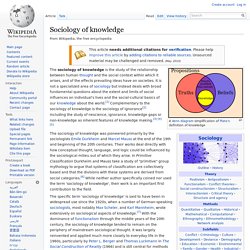
It is not a specialized area of sociology but instead deals with broad fundamental questions about the extent and limits of social influences on individual's lives and the social-cultural basics of our knowledge about the world.[1] Complementary to the sociology of knowledge is the sociology of ignorance[2] including the study of nescience, ignorance, knowledge gaps or non-knowledge as inherent features of knowledge making.[3] [4] [5] The sociology of knowledge was pioneered primarily by the sociologists Émile Durkheim and Marcel Mauss at the end of the 19th and beginning of the 20th centuries.
Their works deal directly with how conceptual thought, language, and logic could be influenced by the sociological milieu out of which they arise. Linguistic relativity. The principle of linguistic relativity holds that the structure of a language affects the ways in which its respective speakers conceptualize their world, i.e. their world view, or otherwise influences their cognitive processes.
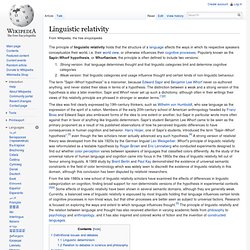
Popularly known as the Sapir–Whorf hypothesis, or Whorfianism, the principle is often defined to include two versions: Strong version: that language determines thought and that linguistic categories limit and determine cognitive categoriesWeak version: that linguistic categories and usage influence thought and certain kinds of non-linguistic behaviour. The term "Sapir–Whorf hypothesis" is a misnomer, because Edward Sapir and Benjamin Lee Whorf never co-authored anything, and never stated their ideas in terms of a hypothesis.
Definitional issues and debates[edit] The concept of linguistic relativity holds that cognitive processes, such as thought and experience, may be influenced by the categories and patterns of the language a person speaks. History[edit] Pluralistic ignorance. In social psychology, pluralistic ignorance is a situation in which a majority of group members privately reject a norm, but incorrectly assume that most others accept it, and therefore go along with it.[1] This is also described as "no one believes, but everyone thinks that everyone believes.
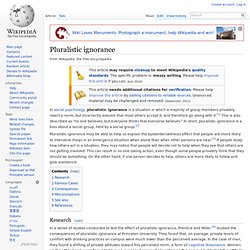
" In short, pluralistic ignorance is a bias about a social group, held by a social group.[2] Pluralistic ignorance may be able to help us explain the bystander(witness) effect that people are more likely to intervene (help) in an emergency situation when alone than when other persons are near.[3] If people study how others act in a situation, they may notice that people will decide not to help when they see that others are not getting involved. This can result in no one taking action, even though some people privately think that they should do something. On the other hand, if one person decides to help, others are more likely to follow and give assistance. Placebo.
A placebo (/pləˈsiboʊ/ plə-SEE-boh; Latin placēbō, "I shall please"[2] from placeō, "I please")[3][4] is a simulated or otherwise medically ineffectual treatment for a disease or other medical condition intended to deceive the recipient.

Sometimes patients given a placebo treatment will have a perceived or actual improvement in a medical condition, a phenomenon commonly called the placebo effect. In medical research, placebos are given as control treatments and depend on the use of measured deception. Common placebos include inert tablets, vehicle infusions, sham surgery,[5] and other procedures based on false information.[1] However, placebos may also have positive effect on a patient's subjective experience who knows that the given treatment is without any active drug, as compared with a control group who knowingly did not get a placebo.[6] The placebo effect points to the importance of perception and the brain's role in physical health.
Since the publication of Henry K. Framing (social sciences) In the social sciences, framing is a set of concepts and theoretical perspectives on how individuals, groups, and societies organize, perceive, and communicate about reality.
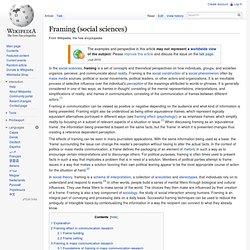
Framing is the social construction of a social phenomenon often by mass media sources, political or social movements, political leaders, or other actors and organizations. It is an inevitable process of selective influence over the individual's perception of the meanings attributed to words or phrases. Carl-Gustav Jung et le néo-paganisme germanique. «L'homme est nécessaire pour illuminer l'obscurité du Créateur.» -- C.G.
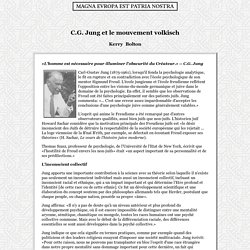
Jung Carl-Gustav Jung (1875-1961), lorsqu'il fonda la psychologie analytique, le fit en rupture et en contradiction avec l'école psychologique de son mentor Sigmund Freud. L'école jungienne et l'école freudienne reflètent l'opposition entre les visions-du-monde germanique et juive dans le domaine de la psychologie. En effet, il semble que les observations de Freud ont été faites principalement sur des patients juifs. Praxis. Un article de Wikipédia, l'encyclopédie libre.
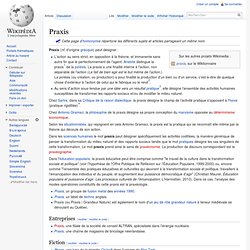
Cette page d’homonymie répertorie les différents sujets et articles partageant un même nom. Sur les autres projets Wikimedia : praxis, sur le Wiktionnaire. Homéostasie. Un article de Wikipédia, l'encyclopédie libre.

Initialement élaborée et définie par Claude Bernard[1], l'homéostasie (du grec ὅμοιος, hómoios, « similaire », et στάσις (ἡ), stásis, « stabilité, action de se tenir debout ») est la capacité que peut avoir un système quelconque (ouvert ou fermé) à conserver son équilibre de fonctionnement en dépit des contraintes qui lui sont extérieures. Selon Walter Bradford Cannon, « l’homéostasie est l’équilibre dynamique qui nous maintient en vie ». Kairos, le dernier mot à la mode... Je ne sais pas si vous êtes comme moi mais j'entends partout parler de Kairos.
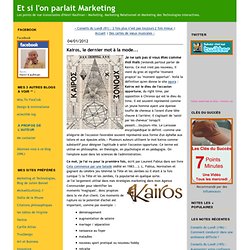
Ce mot n'est pas nouveau, il vient du grec et signifie "moment propice" ou "moment opportun". Rasoir d'Ockham. Un article de Wikipédia, l'encyclopédie libre. Le rasoir d'Ockham ou rasoir d'Occam est un principe de raisonnement philosophique entrant dans les concepts de rationalisme et de nominalisme. Son nom vient du philosophe franciscain Guillaume d'Ockham (XIVe siècle), bien qu'il fût connu avant lui. On le trouve également appelé principe de simplicité, principe d'économie ou principe de parcimonie (en latin lex parsimoniae). Il peut se formuler comme suit : Pluralitas non est ponenda sine necessitate« Les multiples ne doivent pas être utilisés sans nécessité. » L'énoncé Entia non sunt multiplicanda praeter necessitatem, littéralement « Les entités ne doivent pas être multipliées par delà ce qui est nécessaire », est une variante souvent attribuée à Guillaume d'Ockham sans cependant qu'il y en ait trace dans ses écrits.
Une formulation plus moderne est que « les hypothèses suffisantes les plus simples sont les plus vraisemblables ». Avoir ou être? Passages choisis 810821 par Erich Fromm Éditions Robert Laffont © 1978 Différence entre avoir et être.